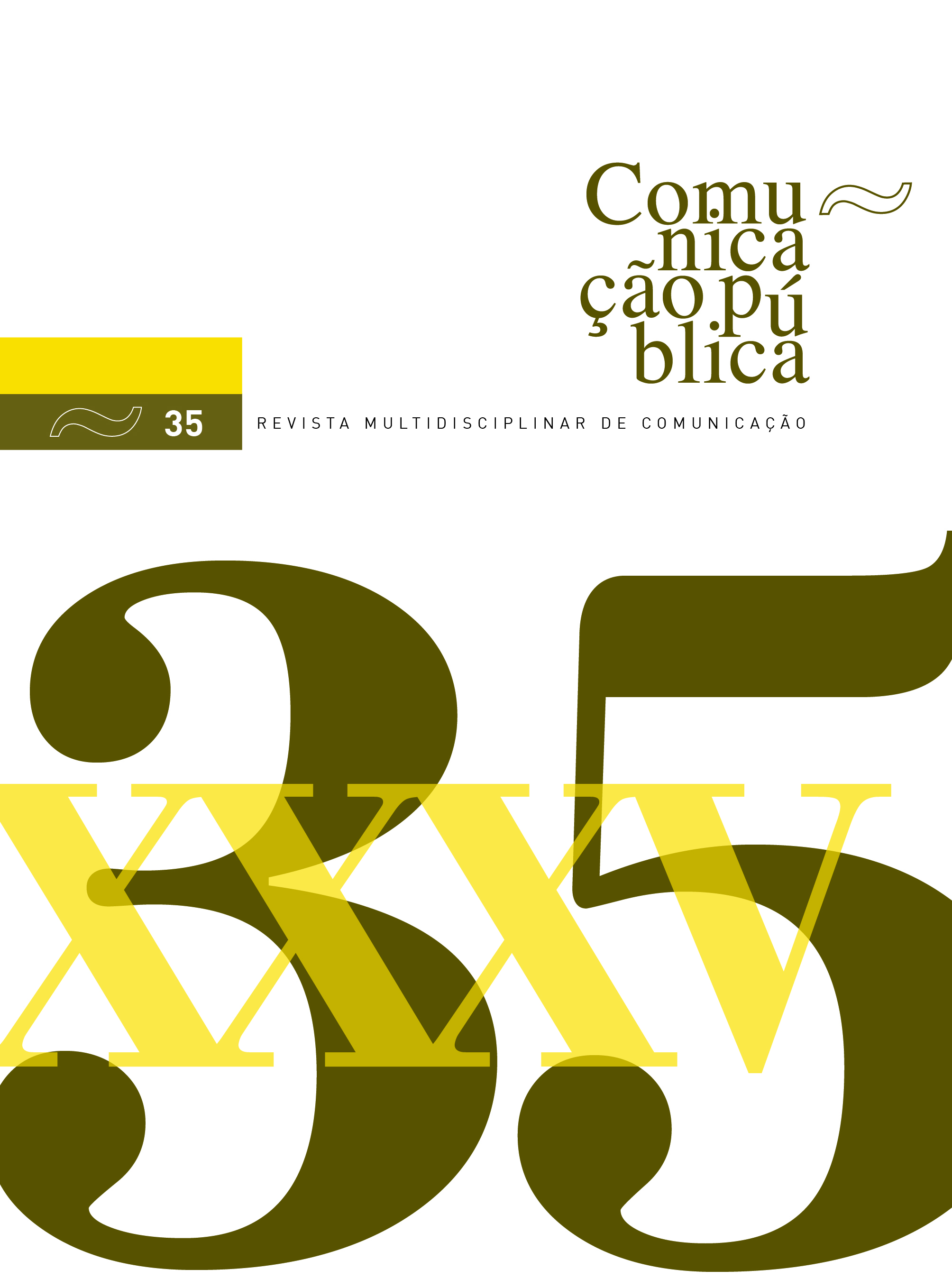Campanhas Eleitorais Online
poder ou equívoco?
DOI:
https://doi.org/10.34629/cpublica.784Palavras-chave:
comunicação política, campanhas eleitorais online, influência da comunicação onlineResumo
20 anos após a publicação do livro de Mário Mesquita O quarto equívoco – o poder dos media na sociedade contemporânea, analisamos como se manifestam, agora, a influência e a interação dos media online no contexto das campanhas eleitorais. Explicamos a evolução da comunicação política desde os primeiros mass media à internet e consideramos as consequências que teve nas sociedades atuais: as oportunidades e as ameaças surgidas. Esta é uma realidade também equívoca, usando a expressão de Mário Mesquita e evitando cair no binómio "otimismo versus pessimismo".
Downloads
Referências
Blumenthal, S. (1980). The permanent campaigning: Inside the world of elite political operatives. Beacon.
Blumler J.G. & Gurevitch M. (1995). The crisis of public communication. Routledge.
Burroughs, B. (2007). Kissing Macaca: Blogs, narrative and political discourse. Journal for Cultural Research, 11(4). http://www.tandfonline.com/doi/full/10.1080/14797580802038686.
Campbell, A., Converse, P. E., Miller, W.E. & Stokes, D.E. (1960). The American voter. Wiley.
Carlson, T. (2008). It’s a man’s world? Journal of Political Marketing,6(1),41.
D’Alessio, D. W. (1997). Use of the web in the 1996 US election. Electoral Studies, 16(4),489-501.
D’Alessio, D. (2000). Adoption of the World Wide Web by American political candidates 1996- 1998, Journal of Broadcasting and Electronic Media, 44, 556-568.
Denver, D. & Hands, H.T.G. (2002). Do political campaigns matter? Routledge.
Farrell, D. M. & Webb, P. (2000). Political parties as campaign organizations. In D. Russell & W. Martin (Eds.), Parties without partisans: political change in advanced industrial democracies. Oxford University Press.
Foot, K. A, Xenos, M., Schneider, S. M., Kluver, R.& Jankowski, N. J. (2008). Electoral web production practices in cross-national perspective. In A. Chadwick& P. N. Howard (Eds.), Routledge book of internet politics. Routledge.
Gibson, R. & McAllister, I. (2006). Does cyber‐campaigning win votes? Online communication in the 2004 Australian election. Journal of Elections, Public Opinion & Parties, 16(3), 243-263.
Gibson, R. & Römmele, A. (2001). Changing campaign communications: A party-centered theory of professionalized campaigning. The Harvard International Journal of Press and Politics, 6 (31).
Gibson, R. & Römmele, A. (2008). Down periscope. Journal of E- Government, 2(3), 85-111.
Gibson, R., Römmele, A. & Ward, S. (Orgs.). (2004). Electronic democracy: mobilisation, organisation and participation via new ICTs. Routledge.
Gibson, R. & Ward, S. (2009). European political organizations and the internet. In A. Chadwick & P. Howard (Eds), Routledge Book of Internet Politics. Routledge.
Gulatti, G. J. “Jeff” & Williams, C. B. (2012). Social networks in political campaigns: Facebook and the congressional election of 2006 and 2007. In New Media Society (pp. 15-52). Sage Pub.
Iosifidis, P. & Wheeler, M. (2018). Modern political communication and Web 2.0 in representative democracies. Javnost The Public, 25 (1-2), 110-118. DOI: 10.1080/13183222.2018.1418962.
Johnson, T.J. & Perlmutter, D. D. (2010). Introduction: The Facebook election. In Mass Communication and Society 13 (pp.554-559). Routledge.
Jr, Peters, & Rosenthal, Cindy. (2011). Speaker Nancy Pelosi and the New American Politics, 1-336. 10.1093/acprof:oso9780195383737.001.0001.
Kamarck, E. C. & Nye, J. S. Jr. (Eds.). (2003). Governance.com: Democracy in the information age. Brookings Institution.
Lazarsfeld, P.F., Berelson, B. & Gaudet, H. (1944). The People’s choice: How the voter makes up his mind in a presidential campaign. Columbia University Press.
Magalhães, P., Aldrich, J., Gibson, R., Cantijoch, M.& Konitzer, T. (2014). Offline and online electoral mobilization: Evidence from CSES Module 4. 2014 Annual Meeting of the American Political Science Association, Washington DC, Estados Unidos da América.
Mesquita, M. (2003) .O quarto equívoco. Edições Minerva Coimbra.
Norris, P. (2000). A virtuous circle: Political communication in post-industrial societies. Cambridge University Press.
Norris, P. (2003). Preaching to the converted. Party Politics,9(1), 21-45.
Persily, Nathaniel (2017). Can Democracy Survive the Internet?, 28 Journal of Democracy 63 (2017).
Richards, B. (2007). Emotional governance: Politics, media and terror. Palgrave Macmillan.
Roemmele, A., & Gibson, R. (2020). Scientific and subversive: The two faces of the fourth era of political campaigning. New Media and Society, 22(4), 595-610. https://doi.org/10.1177/1461444819893979.
Schmitt-Beck, R. & Farrell, D. M.(2002). Studying political campaigns and their effects. In D. M. Farrell & R. Schmitt-Beck (Eds.), Do political campaigns matter? Campaign effects in elections and referendums (pp. 1-21). Routledge.
Strömbäck, J. (2007). Political marketing and professionalized campaigning: A conceptual analysis. Journal of Political Marketing, 6 (2/3), 49-67.
Thurber, J. (2002). Is the permanent campaign alive and well after the 9/11? Journal of the APSA Legislative Studies Group. www.american.edu
Vaccari, C. (2013). Digital politics In Western Democracies: A Comparative Study. J.H. University Press.
Vergeer, M. (2013). Politics, elections and online campaigning: Past, present… and a peek into the future. In New media & society 15 (pp. 9-17). Sage Publications.
Vergeer, M. (2015). Twitter and political campaigning, In Sociology Compass 9/9, 745-760, Wiley-Blackwell.
Vergeer, M., Hermans, L. &Sams, S. (2011). Online social networks and micro-blogging in political campaigning: The exploration of a new tool and a new campaign style. In Party politics (pp. 1-25). Sage Publications.
Ward, S. & Lusoli, W. (2003). Dinosaurs in cyberspace? British trade unions and the internet. In European Journal of Communication, 18(2), 147-79.
Downloads
Publicado
Edição
Secção
Licença
Direitos de Autor (c) 2023 Copyright (c) 2023 Author

Este trabalho encontra-se publicado com a Licença Internacional Creative Commons Atribuição-NãoComercial 4.0.
Os conteúdos da Comunicação Pública estão licenciados com uma licença Creative Commons - Atribuição-NãoComercial 4.0 Internacional.




